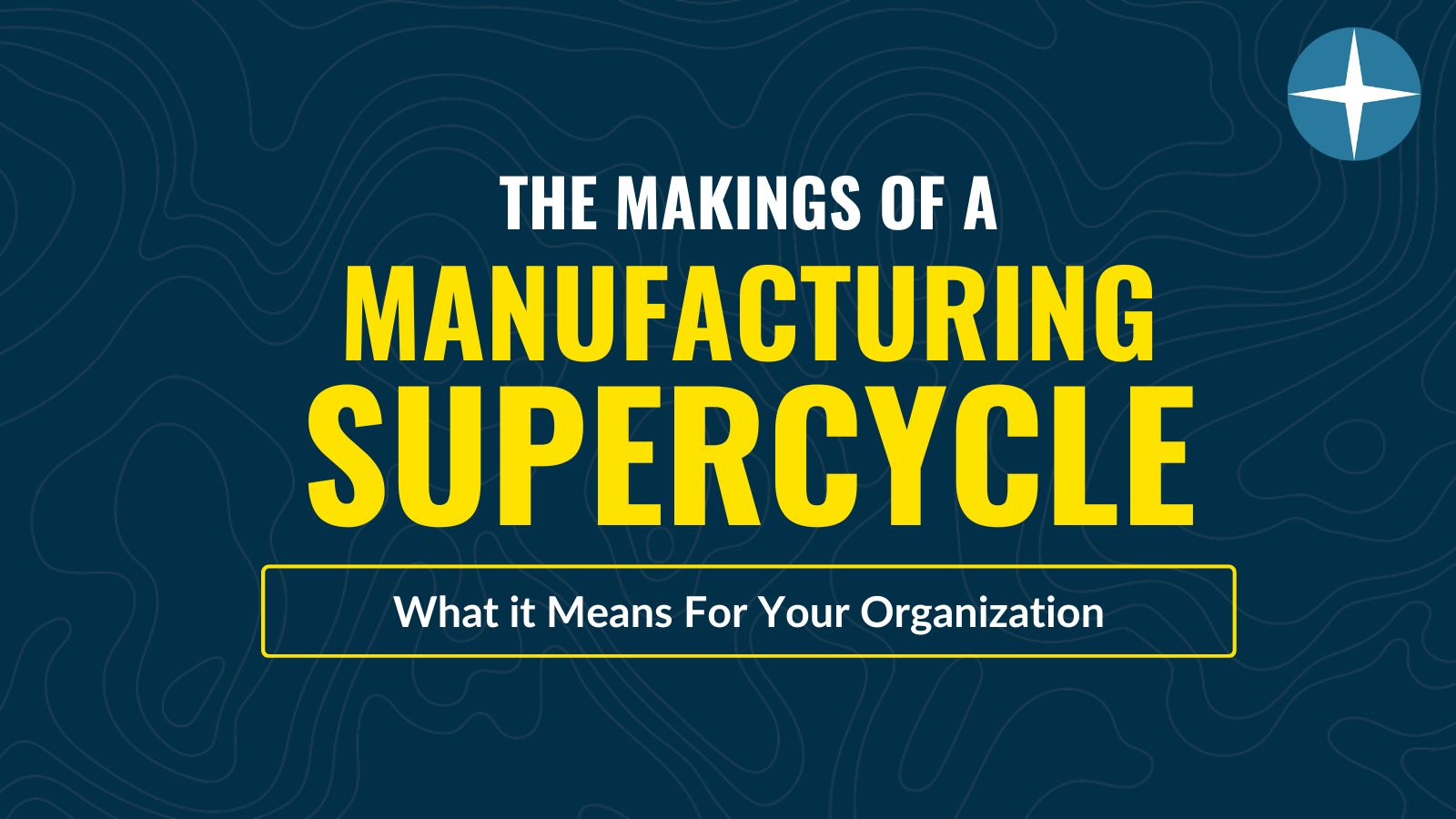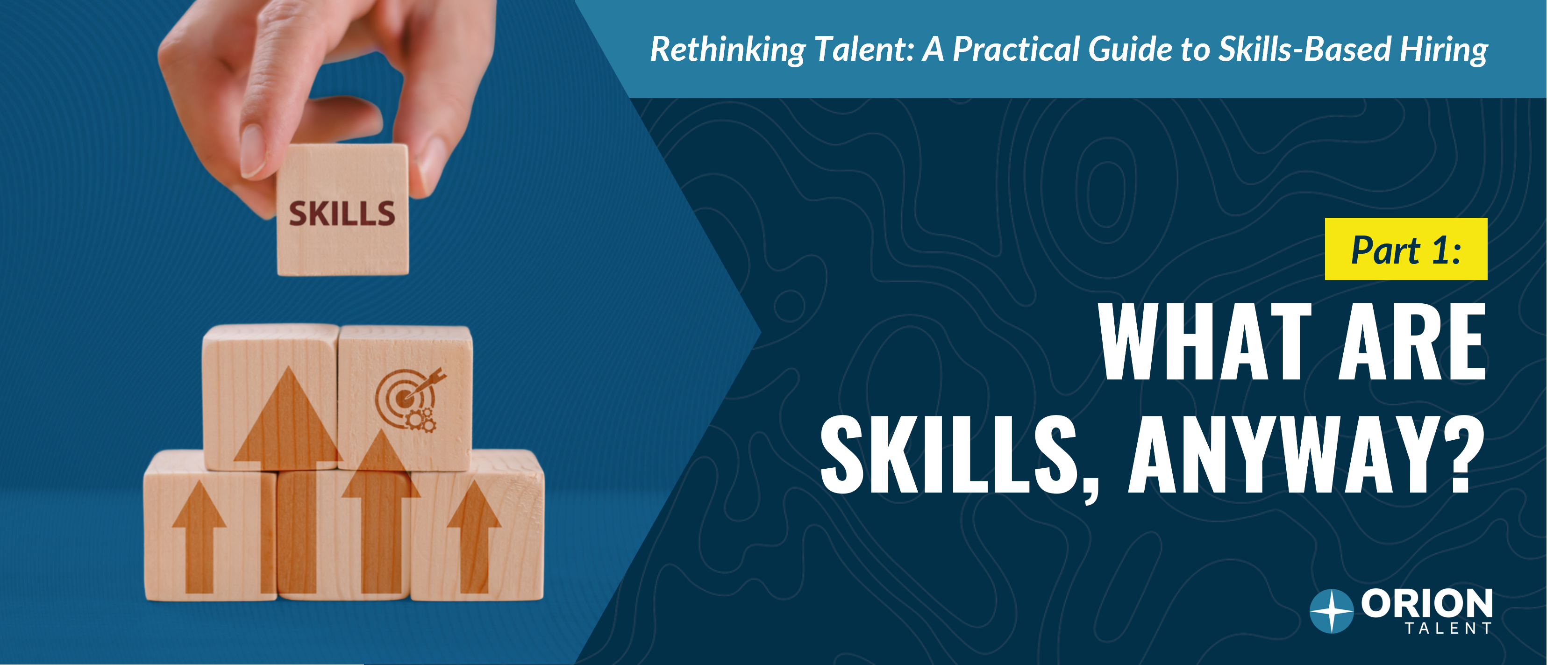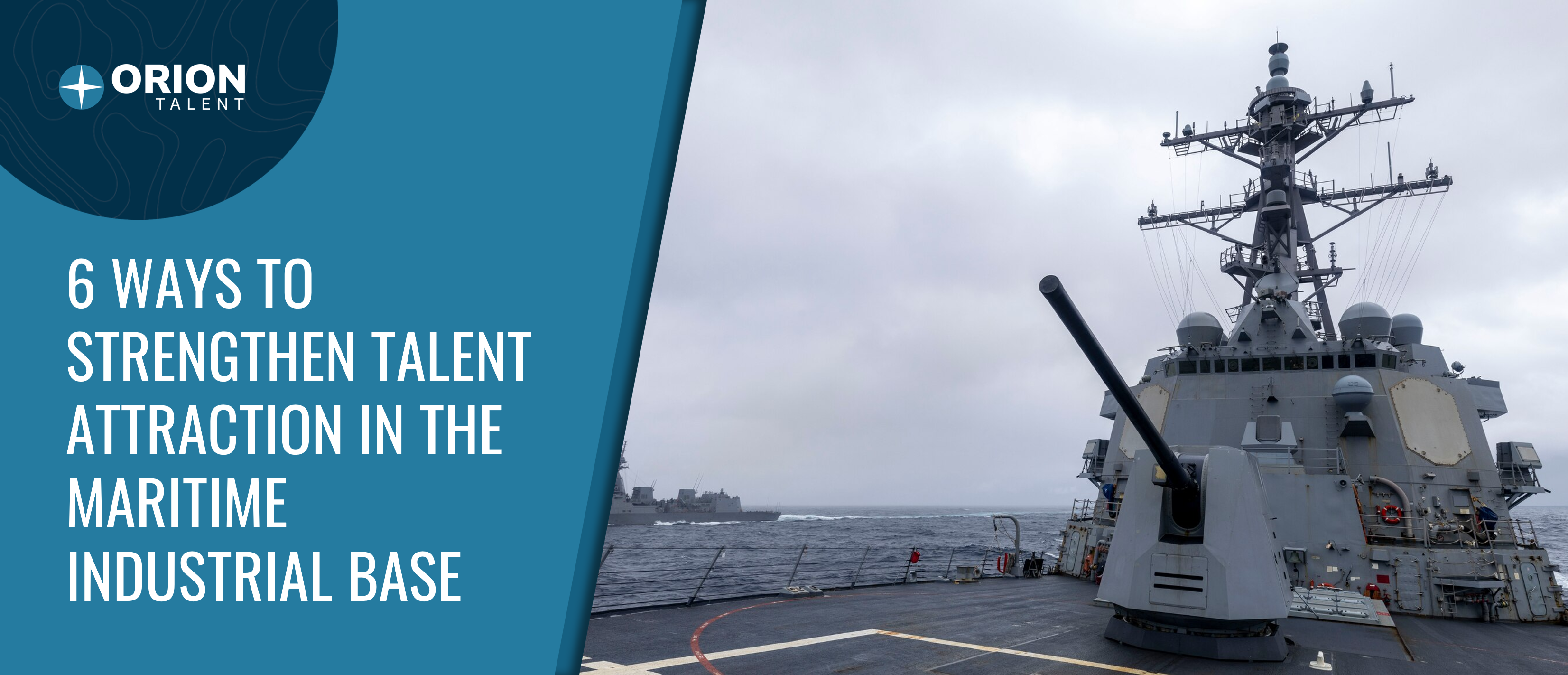
Manufacturers look to recruitment process outsourcing to solve the skilled talent shortage
After 2023’s economic uncertainty, there’s good news for manufacturing companies! New investments in the industrial sector are about to shape the economic landscape for years to come. According to Joseph P. Quinlan, head of CIO Market Strategy at Merrill and Bank of America Private Bank, the U.S. is in the early stages of a manufacturing supercycle. What exactly does this mean for your organization? Read more to find out about what a supercycle is, why US manufacturing investment is increasing, where investment is occurring, and how manufacturers can close the skilled talent gap to meet increased demand.
The Makings of a Supercycle
According to the Corporate Finance Institute, a supercycle is a period of strong economic growth, leading to sustained demand for commodities. Fortune expands upon this, defining a supercycle as “a sustained spell of abnormally strong demand that producers struggle to match, sparking a rally in prices that can last years or in some cases a decade or more.”
There have been 4 supercycles in the past 150 years, corresponding with periods of rapid industrialization in the global economy:
- Late 1800s – U.S. industrialization and the use of oil in manufacturing, shipping, and automobiles
- 1930s – Global rearmament before WWII
- 1950s /1960s - Reindustrialization of Europe and Japan following WWII
- Late 1990s / early 2000s – Industrialization and economic growth of China; China becomes member of the World Trade Organization
The global transition to renewable energy, expanding data infrastructure, and the overhaul of US infrastructure may be contributing to a new supercycle – and economic opportunities for those closely tracking developments. In addition, Goldman Sachs believes that we’re experiencing the start of a metals supercycle that will last for decades. Analyst Jeffrey Currie compares metals to oil in the 2000s, suggesting that copper – which is indispensable in global decarbonization strategies - may be the new oil.
Increased Investment in US Manufacturing
Axios reports that massive investment in manufacturing is set to shape the economic landscape for the foreseeable future. Billions of dollars have been allocated to new projects nationwide - battery manufacturing, solar cells, semiconductors, and more - by the Inflation Reduction Act, Bipartisan Infrastructure Law, and CHIPS and Science Act. The demand for workers and raw materials will be sustained for many years to come.
.jpg) Construction spending by US manufacturers more than doubled over the past year. The amount of money spent on manufacturing construction reached $196.1 billion in July 2023, more than triple the rate in 2010. In addition, the US has become a destination for foreign corporate investment, and the capital outlays are far greater than those seen in the 2010s. Foreign investment in the US will only increase as global corporations rethink and rebuild their global supply chains post-pandemic.
Construction spending by US manufacturers more than doubled over the past year. The amount of money spent on manufacturing construction reached $196.1 billion in July 2023, more than triple the rate in 2010. In addition, the US has become a destination for foreign corporate investment, and the capital outlays are far greater than those seen in the 2010s. Foreign investment in the US will only increase as global corporations rethink and rebuild their global supply chains post-pandemic.
The Reshoring Institute reports robust growth across all manufacturing sectors in America and has witnessed a slow but steady reshoring of manufacturing and sourcing in the United States. After nearly 30 years of underinvestment, investment dollars are going to US manufacturers. American companies are moving manufacturing back to the US from Asia to reduce their reliance on global supply chains, with General Motors, Intel, and US Steel recently opening new factories in America. Kearney’s 2022 Reshoring Index found that 96% of American companies have shifted production to the US or are evaluating reshoring their operations.
The South Becomes a Manufacturing Hot Spot
Infrastructure development and supply chain enhancements lead to the need for new manufacturing facilities, warehouses, and distribution centers. The American South is receiving a significant amount of manufacturing investment. Firms like Samsung, Texas Instruments, and Tesla are expanding operations in Texas. Florida is experiencing significant advanced manufacturing investment, and Toyota, Hyundai, BMW, and Albemarle’s investment of billions of dollars into the “Battery Belt” has created thousands of jobs in Georgia, Tennessee, and the Carolinas.
Investments in clean energy, infrastructure, and semiconductor production throughout the South will stimulate large-scale job creation to support the manufacturing sector. Manufacturing strengthens local economies by creating employment opportunities, fostering local economic growth, and driving area development. According to a report by the Reshoring Institute, for every $1 of domestic manufacturing value added, $3.60 of economic activity is generated across the economy.
Manufacturing also powers the global economy, and it looks much different than it did just a few decades ago. Check out this blog post to learn more about surprising trends in the manufacturing industry, including the move to sustainable manufacturing and how innovation is transforming the industry.
Manufacturing Talent Shortage
The US manufacturing industry employs approximately 12 million workers, and the US has added 800,000 manufacturing jobs in the last two years alone. Yet the manufacturing industry is facing a skills gap that could lead to 2.1 million unfilled jobs by 2030.
According to a study by Deloitte, manufacturers are struggling to fill critical jobs. US manufacturing executives surveyed report that finding the right talent is 36% harder than it was in 2018. Getting entry-level employees in the door and the rising challenge of filling skilled positions is proving very challenging. Companies must continue to find ways to broaden their talent pipeline, foster inclusive cultures, and create opportunities for upskilling their existing workforce.
surveyed report that finding the right talent is 36% harder than it was in 2018. Getting entry-level employees in the door and the rising challenge of filling skilled positions is proving very challenging. Companies must continue to find ways to broaden their talent pipeline, foster inclusive cultures, and create opportunities for upskilling their existing workforce.
Unfilled jobs have a significant impact on organizations. According to Deloitte, nearly 8 in 10 manufacturing executives say that not filling jobs has a moderate to very high impact on maintaining the production levels needed for satisfying growing customer demand, implementing new technologies, responding to new market opportunities, and supporting new production development and innovation.
Manufacturers must look for new solutions to ensure they have the right workforce in place despite a talent shortage environment. When local direct sourcing is not adequately filling open roles, businesses should consider partnering with a recruitment process outsourcing partner with a large candidate talent pool and a track record of high-volume recruiting success. They’ll streamline the talent funnel, fill positions, and free up time for leadership to focus on other vital business operations. Orion Talent, for example, has placed more than 20,000 candidates into various roles within the Manufacturing Industry and has access to a large talent pool with unmatched technical training and expertise.
In addition, sourcing from underutilized talent pools, such as transitioning military service members and veterans, is an ideal solution to the skilled talent shortage. Many service members have experience that translates well to the manufacturing industry, and with 200,000 service members transitioning out of the armed forces annually, this is an opportunity not to be missed. Check out Orion’s Military Hiring Solutions to learn more about the benefits of hiring veterans, and how to add military talent to your organization today.
Are You Ready for the Manufacturing Supercycle?
Buckle up, because the manufacturing supercycle is here, and it's set to reshape the landscape of American industry.
Manufacturing professionals find themselves at the forefront of a transformative era. The road ahead promises challenges, including the redevelopment of a robust supply base and overcoming a significant skilled talent shortage, but it also presents unprecedented opportunities for growth and innovation for those willing to think outside the box. Check out Orion Talent’s Best-in-Class Hiring for the Manufacturing Industry and learn how you can put the industry’s most committed, outcome-driven recruitment force to work for you.
Archives
- February 2026
- January 2026
- December 2025
- November 2025
- October 2025
- September 2025
- August 2025
- July 2025
- June 2025
- May 2025
- April 2025
- March 2025
- February 2025
- October 2024
- May 2024
- March 2024
- February 2024
- January 2024
- December 2023
- November 2023
- October 2023
- September 2023
- August 2023
- July 2023
- June 2023
- May 2023
- April 2023
- March 2023
- February 2023
- January 2023
- December 2022
- November 2022
- October 2022
- September 2022
- August 2022
- July 2022
- June 2022
- May 2022
- April 2022
- March 2022
- February 2022
- January 2022
- December 2021
- November 2021
- October 2021
- September 2021
- August 2021
- July 2021
- June 2021
- May 2021
- April 2021
- March 2021
- February 2021
- January 2021
- December 2020
- November 2020
- October 2020
- September 2020
- August 2020
- July 2020
- June 2020
- May 2020
- April 2020
- March 2020
- February 2020
- January 2020
- December 2019
- November 2019
- October 2019
- September 2019
- August 2019
- July 2019
- June 2019
- May 2019
- April 2019
- March 2019
- February 2019
- January 2019
- December 2018
- November 2018
- October 2018
- September 2018
- August 2018
- July 2018
- June 2018
- May 2018
- April 2018
- March 2018
- February 2018
- January 2018
- December 2017
- November 2017
- October 2017
- September 2017
- August 2017
- July 2017
- June 2017
- May 2017
- March 2017
- February 2017
- January 2017
 RSS Feed
RSS Feed




















